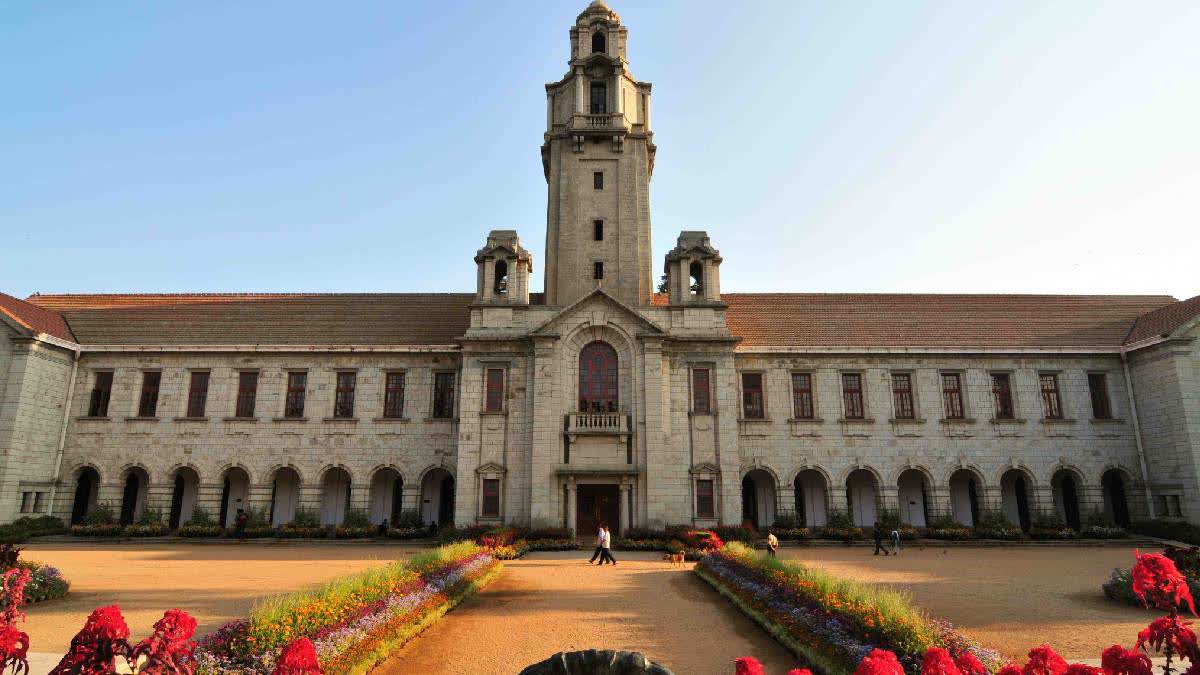
File photo of IISc (ETV Bharat)
Bengaluru: The Department of Electronic Systems Engineering (ESE) at the Indian Institute of Science (IISc), Bengaluru, has introduced a new integrated attendance and parking system aimed at improving transparency, discipline and accountability within the department. However, students have submitted a petition to the director demanding its immediate withdrawal.
In a letter addressed to students and staff, Professor Mayank Shrivastava, chairperson of the ESE department said the initiative has been introduced in response to repeated requests for flexibility in attendance recording and parking-related concerns. The department wants to balance flexibility with a strong sense of commitment and shared responsibility, he said.
“The purpose of this new system is not rigidity, but to reinforce commitment towards work, while giving complete flexibility in choosing your working hours,” the letter stated.
Under the policy, permanent and contractual staff are required to work 40 hours a week, excluding lunch hours. MTech and first-year PhD students are expected to spend at least 50 hours per week in the department. PhD students beyond their first year are expected to match their advisors’ workload, typically 70–80 hours per week, though officially the department will record a minimum of 50 hours.
Students working in central facilities such as the National Nanofabrication Centre (NNFC), Micro and Nano Characterisation Facility (MNCF), or the IISc Microscopy Facility are required to log additional hours and submit evidence of their usage, including booking records. Those permitted to work from home due to medical or personal reasons must upload supporting documents.
Prof Shrivastava said the system is designed to be “transparent, efficient and fair to all members of ESE”, and will also enhance the security of laboratories and infrastructure.
Students Call Policy “Unrealistic”, Warn of Mental Health Issues
However, the new attendance rules have triggered widespread outrage among IISc students, who describe it as oppressive and harmful to mental health.
Students argue that the policy effectively enforces a 70–80 hour work week for PhD scholars and a minimum 50-hour for others, which they say could worsen existing mental health challenges and lead to burnout, social isolation and even suicides.
“We are already struggling with mental health issues. This policy feels like the administration is testing how far they can push us until the next suicide,” a student told ETV Bharat on condition of anonymity.
According to student representatives, the new rules will erode the spirit of research, replacing curiosity-driven exploration with compulsory and monitored presence. “Research should be driven by love for learning, not by attendance records,” one student remarked.
Several students have submitted a petition to the IISc Director, demanding immediate withdrawal of the attendance policy. They argue that the rule not only disregards the emotional well-being of students but also ignores their input. The petition emphasises that academic freedom and mental health are at stake, and calls for a more compassionate and flexible approach.
“Invasive Surveillance” And “Unequal Accountability”
A major point of contention is the monitoring mechanism proposed in the policy. Attendance and working hours will be tracked using RFID cards and facial recognition technology at department entry points.
Students have labelled this system as “invasive and insulting”, saying it creates an environment of surveillance rather than trust. They also highlight that the monitoring applies only to students and staff, not to faculty members, which they see as a sign of institutional hierarchy.
“This one-sided monitoring shows students and staff their place in the campus hierarchy. It has absolutely nothing to do with productivity or accountability,” another student told ETV Bharat.
The discontent has been further fuelled by reports that IISc has issued a tender for 7,000 RFID cards, possibly indicating a campus-wide rollout of similar tracking systems in the future.
Students also allege that the shift reflects corporate influence within the institute, claiming that such policies prepare students for corporate-style work environments rather than fostering independent scientific inquiry. They argue that the emphasis on “visible commitment” mirrors industry practices and risks turning IISc into a “supply line for corporate brain workers.”
In their petition to the Director of IISc, students have demanded an immediate withdrawal of the new attendance policy. They have urged the administration to instruct other departments not to frame any rules that involve monitoring of student working hours. The petition further calls for attendance policies to be more accommodative of mental health challenges and for the institute to take steps that prevent excessive workload and invasive surveillance in future policies.
ETV Bharat reached out to the Director of IISc seeking comments on the widespread opposition to the new attendance policy and the petition submitted to the administration. However, the Director declined to speak on the matter.
As the debate continues, the issue has become a larger reflection of how premier academic institutions balance accountability with autonomy and discipline with well-being. For now, IISc’s new attendance policy remains a flashpoint —one that has reignited conversations on the pressures of academic life and the boundaries of institutional control.
Also Read
Atomic Tweaks, Major Impact: IISc Unlocks New Path For Drug Delivery Via Chalcogen BondingIISC Scientists Develop A New Desalination System To Turn Seawater into Drinking Water
